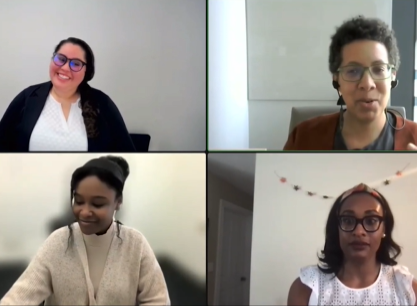
WiDS Cambridge explores challenges and opportunities for data science
The field of data science continues to grow and evolve, leaving some to wonder what their place is in it. “Data science is a very amorphous, inherently and necessarily interdisciplinary thing,” said Sarah Brown, a professor of computer science at the University of Rhode Island. “What you’re perceiving as the edge of data science may actually be in data science.”
Brown gave these remarks at WiDS Cambridge, the regional Women in Data Science conference which IDSS has co-led since 2017. WiDS is a worldwide initiative that educates data scientists of all genders while spotlighting the contributions of women to the field, originating at Stanford.
Through morning and afternoon panel talks, WiDS Cambridge 2022 examined two timely aspects of the field: opportunities and challenges for women of color practitioners, and the role data science can play in mitigating climate change and its impacts.
Diversifying the field of data science presents not one monolithic challenge, but many different ones, as panelists discussed. There is energy for DEI, but not enough action. Efforts may be seen as successful if they attract more women, even if most of the women are white. Not enough is being done to retain women who are already in the field. And issues facing women differ. Disaggregating data and including complementary, qualitative work — especially asking women of color why they leave the field — are needed to understand the problems and find solutions.
Panelists also discussed the value of diversifying the field, as “women of color are uniquely positioned to see problems with things that make for amazing research,” said panelist Ashia Wilson, who teaches in EECS here at MIT. “You don’t have to be experienced with systemic racism to be informed about systemic racism,” added panel moderator Alana Anderson, the Assistant Dean of Diversity, Equity and Inclusion for the MIT Schwarzmann College of Computing.
Two key takeaways from the Climate panel: there are many ways to use data analysis, machine learning, and AI to help mitigate climate change, and many innovative data sources to use. Built environments can have monitors and sensors, but panelists also talked about applications using Tiktoks, tracking butterflies, and estimating the carbon footprint of machines running algorithms, models, and machine learning.
IDSS professor Jessika Trancik discussed her work using data-informed models to advance climate solutions, from speeding up the development time and potential success of technological innovations to informing policy that is proactive instead of reactive to negative climate externalities. On the question of making an impact, she advised: “You may want to go directly to finding the right answer in an applied sense, but you may actually have more impact by explaining [to stakeholders and policymakers] what’s driving the system.”
WiDS Cambridge was a virtual event attended by over 250 people, and included lightning talks, recruiting sessions, a datathon, and a keynote by Dr. Catherine Lilian Nakalembe, Associate Research Professor at the University of Maryland, about using AI in agriculture to fight food insecurity in sub-Saharan Africa. Watch WiDS 2022 here and on Youtube.



